by Heather Plett | Aug 27, 2014 | Community, growth, Leadership, Uncategorized
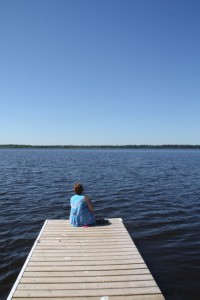 Nobody told me about the loneliness.
Nobody told me about the loneliness.
Nobody told me that growth can leave you feeling like you’ve stepped out onto a dock all alone and nobody’s there to reach out a hand to steady you when the waves come. Nobody mentioned that the friends who surrounded you on the shore can feel suddenly distant and unavailable.
Nobody talks about it because you’re supposed to be able to figure this stuff out. You’re supposed to know how to get your sea legs, how to walk without wobbling. You’re supposed to be independent in this new growth of yours and not need people as much as you did before.
Nobody talks about it and so you don’t talk about it either. Because you don’t want to be the only one standing out there looking lost and bewildered while everyone else stands confidently. There’s some shame in turning back to those friends on the shore and saying “Look, I’ve grown… but I’m lonely.” There’s even more shame in looking across at the other docks at the people who’ve also grown but seem so much more sure-footed and saying “Ummm… I know we’re supposed to figure this stuff out on our own, but I’m feeling a little lost. Can you come over here for awhile and hold me until I get my sea legs?”
It’s happened to me every time there’s been growth in my life.
The first time loneliness really hit me was when I became a mother. Suddenly all my single friends no longer understood what I was going through and they were still busy doing what single people do while I was fumbling my way through diapers and sleepless nights. I didn’t know how to make new friends in this foreign world of motherhood, and I was pretty sure all the other moms must have been privy to some insider knowledge about how to do this motherhood thing that I didn’t have. I was afraid to admit how lost I was. I remember tentatively reaching out to one mom and trying to admit how I was feeling and she looked at me with what I interpreted as judgement for how inept I was, but was probably a look of understanding mixed with her own fear of admitting how lost she was. I was more reluctant to reach out again after that.
The next time the loneliness hit me was only a couple of years later when I became a senior manager for the first time. Suddenly I was set apart from all of the colleagues and friends that had been my peers just days before. Suddenly I wasn’t let in on the office gossip anymore or invited to the after-work drink dates quite as often. I was a leader now – I was supposed to be self-sufficient and confident and I wasn’t supposed to admit that I was in over my head and really needed some friends to remind me what I was capable of.
Once again, I didn’t know where to turn. I tried to reach out to other managers to form a support group or conversation circle, but there was little reception. They were either too busy trying to maintain their confident leader personas or they’d found other ways of getting the support they needed.
It took a long time, but gradually I found a little support. I started having lunch dates with my friend Susan, one of the only other senior managers I could find who was willing to be vulnerable enough to admit that she didn’t have this leadership stuff all figured out. And then one day I found myself at Authentic Leadership in Action Summer Institute where the opening speaker invited our vulnerability and fear and curiosity and suddenly I realized I was among like-minded people who weren’t afraid to admit that they don’t always know what they’re doing. Suddenly I knew I’d found my tribe.
Not long after that, I went for training in The Circle Way, and the same thing happened. People sat in circle and cracked their hearts open and I knew that I had found my home.
What I realized, around the same time, is that this loneliness is not isolated to career-related growth. It can happen when you change your religious beliefs or leave a faith community or tradition. It can happen when you change your priorities or leave broken relationships. It can happen any time you take a step onto a dock that’s unfamiliar to the people who were standing with you on the shore. You leave people behind, often before you know where to find the next community.
By the time my next major growth curve came along, I was more prepared for the loneliness. When I started teaching, I knew that, once again, I’d be set apart from the other people in the room, wouldn’t be let in on the inside jokes, and would always be seen as “other”. Fortunately, I knew where to turn to when the loneliness came. I’d found my tribe. I had support. The loneliness was fleeting.
The same was true when I launched my own business. I was no longer going in to an office where I could enjoy the camaraderie of coworkers and, though I felt some isolation in that, I knew how to find support in my online circles. My friend Desiree was launching her business at the same time, stepping out onto her own dock, and so we had weekly Skype chats to help each other get our sea legs. Sometimes we cried, sometimes we gave each other tough love, and sometimes we celebrated. There were other people too. I was no longer afraid to be vulnerable and authentic. I found support and I offered it.
I haven’t forgotten the early days, though. I haven’t forgotten what it was like to be out there on the dock all alone. I haven’t forgotten how hard it was to reach out and admit that I was scared.
That’s why I now make a conscious effort to turn around and look for people who are stepping out on their own docks behind me. I watch for them and when I see them stumble I reach out a hand to steady them. I don’t want them to feel lonely. I don’t want them to feel like they can’t admit how scary this big new step is. I want them to feel supported.
I want to encourage them to give themselves permission to be vulnerable.
“I’m not a teacher: only a fellow traveler of whom you asked the way. I pointed ahead – ahead of myself as well as you.” – George Bernard Shaw
Trust me – it’s much easier to grow when you give yourself permission to admit how lost and alone you feel. It’s much easier to find your sea legs if you reach out for a hand to steady you. Sure it’s scary, but it’s worth it. And the surprising thing that I’ve discovered is that reaching out for support is actually a sign of strength rather than a sign of weakness.
Several years ago, I took my daughter Maddy to see a 3D version of Cloudy with a Chance of Meatballs. She was pretty young at the time and it was her first 3D movie, so she was in awe of how the screen was coming alive. Each time something would fly at her, she’d reach out to try to grab it. It didn’t seem to bother her that she never got her hands on anything.
With a grin splitting her face, she turned to me and said “Reach out Mom! It’s way better when you reach out!” I smiled back, started reaching out, and she was right – it was WAY better.
And so I say the same to you. “Reach out friend! It’s way better when you reach out.” Reach out for support. Reach out for kindness. Reach out for someone to hold you up when your knees give out.
And then, when you’re ready, reach out for the next person behind you who needs the same support.
Also, if you are one of those people stepping out onto the dock and you’re feeling lost and alone and you’re pretty sure everyone else is more confident than you, I’ve created a coaching program just for you. I want to help.
by Heather Plett | Dec 20, 2013 | Leadership, Uncategorized
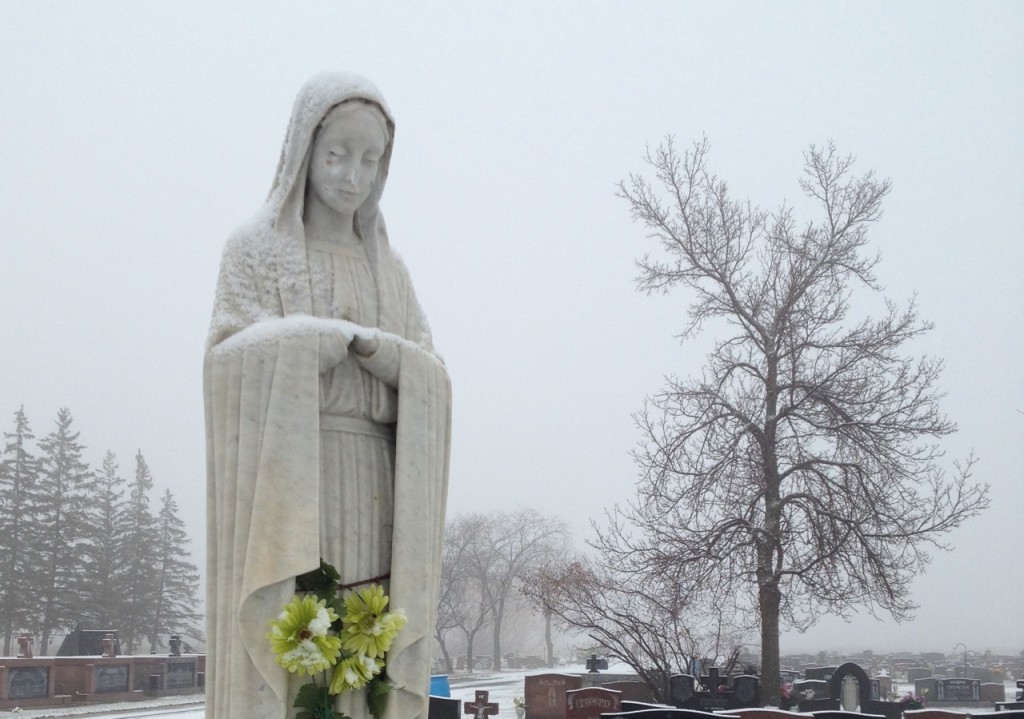 Archbishop Desmond Tutu was once boarding a plane flying out of South Africa, a few years after apartheid had ended, and he was delighted to see that the pilot was black. “Finally!” he thought. “My people can fly planes! We’re making progress!”
Archbishop Desmond Tutu was once boarding a plane flying out of South Africa, a few years after apartheid had ended, and he was delighted to see that the pilot was black. “Finally!” he thought. “My people can fly planes! We’re making progress!”
A few hours later, the plane hit turbulence, and his immediate thought was “can a black man really be trusted to navigate this plane safely through this rough patch?”
The thought surprised him and made him realize how deeply oppression imbeds thoughts of unworthiness in the minds of those being oppressed. Though he was a powerful advocate for justice, he too had fallen victim to the power of the oppressor to change the very way a person thinks about his own people and himself.
I’ve had a fairly profound realization lately, that the same can be said for my most instinctual response to the rise of the feminine in the face of the patriarchy. Though I’ve been a feminist for almost as long as I’ve known the definition of the word, I serve on the board of a feminist organization, I’ve fought my way through the glass ceiling to senior leadership positions, and I write and teach a lot about women’s leadership, there still remain some instinctual, deep-rooted beliefs that I am not fully worthy because I am a woman.
Or… Let me correct that… It’s not simply an unworthiness of me as a women (because I’ve gotten quite used to women in power, have been in positions of power myself, and don’t think I have any deep-seated issues that I need to excavate in that regard). It’s more of a sense that the feminine (whether it appears in women or men) is not quite worthy of power.
Let me explain…
When I left my last formal employment in a leadership position, I did it partly because I was burnt out from the tension I felt between the two tugs – either lead in the way the patriarchy accepted, or turn against the stream and lead with my feminine heart in a masculine-dominated world. I’d tried both, and both were equally stressful for me. I either had to give up what came instinctually for me and live an inauthentic life, or I had to have the courage to face the criticism I received when I dared to lead with more vulnerability, ambiguity, love, and community.
When I first became self-employed, I started a blog called Sophia Leadership, which was all about bringing more feminine wisdom into leadership. (Sophia being the Greek word for feminine wisdom.) I’ll be honest… I had a bit of an uneasy relationship with that blog. I loved it and I wrote my heart out, but I didn’t share it broadly with my former colleagues or my students at the university. I’d been so frequently wounded in my own attempts to bring the feminine into my leadership, that I was afraid to be ridiculed for writing something that I expected they’d judge as “woo-woo” or too “touchy-feely”.
At that time, I had a more professional website at heatherplett.com, and that was the one I shared with students, potential clients, and former colleagues. I was more comfortable with them seeing me behind the mask of my professional persona.
After awhile, though, I got tired of maintaining two sites that made me feel splintered, and so I combined them at heatherplett.com. That took some courage (because now my students, who have to access my site to get to their assignments and class notes, would witness me pouring my heart out on my blog), but once I did it, it felt good, and there were positive results (like four students in my class asking if I’d consider coaching them in non-class-related life changes).
Feminine leadership continued to drive much of what I wrote about and taught about (eg. Lead with your Wild Heart), but the more I focused on that, the more I realized that I was targeting my work specifically for women. That’s not a bad thing, but it hadn’t been my original intent. When I created Sophia Leadership, it had always been with the intent to bring more of the feminine into ALL of leadership, not just into the way women lead.
A couple of interesting things happened this Fall that helped me realize that some of the direction my business was taking was related to my own fear and my own deeply-rooted sense of inadequacy in the face of the patriarchy.
I was approached by a local training organization to teach workshops for executive directors in non-profit. I was flattered, but my instinctual thought was “oh… I don’t really think that’s my target audience. After all, my work will probably be too touchy-feely for them, and what they’ll be looking for will be more of a traditional leadership approach.”
It took me awhile to realize that my response to the invitation was not unlike Desmond Tutu on that plane. When push comes to shove, I don’t fully trust my feminine approach to leadership to be good enough. And I’m fearful that, if I trust it, I’ll crash the plane and people will get hurt.
Sure, it’s good enough for the women who’ve come to my leadership retreats, who read my blog, and who’ve participated in Lead with Your Wild Heart, but it’s probably not good enough FOR MEN. That’s the bottom line.
It pains me to admit this out loud, after all that I’ve been teaching and advocating for in the last three years (because what if you start to think that I don’t practice what I preach?), but I think it’s something that we need to bring out of the shadows and into the light. I think it’s a story that many of us share and that we’re afraid to admit, so it will continue to haunt us.
Do we REALLY believe in the power of the feminine, or do we only believe (in the deepest, shadowy recesses of our hearts) that this is fine for women, but when it comes to REAL power, we have to fall back on the masculine model?
Since I started taking a closer look at this shadow in myself, it’s been showing up in other ways as well (including my dreams). I realized it when a couple of men bought copies of Pathfinder and I was more flattered than the dozens of women who’d bought it before them. Why? Because in my shadowy, wounded heart, I thought that my wisdom was good enough for women, but wouldn’t really be considered valuable by men.
It really surprised me that this was coming up for me, considering how long I’ve been working on this exact issue, and how many years I sat confidently at boardroom tables, surrounded by men but never doubting that I was equal to them and had lots of wisdom to share at those tables. Why didn’t I doubt it then? Because I was good at putting on a masculine mask and sharing my wisdom in a way that was acceptable in a patriarchal world. Very little that I said at those tables was a threat to them, because I wasn’t really challenging them to accept paradigms that they weren’t comfortable with.
Now my work has shifted, and I AM asking them to accept new paradigms, and it’s a whole lot scarier, a whole lot more authentic, and a whole lot more susceptible to their resistance and criticism. This is where the rubber hits the road, and suddenly I don’t feel as confident as I once did, because I now have to expose all of the wounds I suffered in all of those years of leadership. And if I expose wounds, I might make some of them feel uncomfortable when they realize they are the perpetrators of some of those wounds (if not in me, then in other people trying to lead authentically). AND I might even have to admit that I was the perpetrator of wounds for some people, back in my mask-wearing days.
It’s all rather scary stuff, and putting it out here on my blog feels even more scary. This is vulnerability, though, and vulnerability and courage are close companions.
In rather profound timing, I’ve been reading Marion Woodman’s book “Leaving My Father’s House: A Journey to Conscious Femininity”. In it are the stories of three women who, like me, are on long journeys deeper into their feminine. The book has been bringing up a lot for me (and inducing some of the wildest dreams, since Woodman teaches a lot about what the psyche is trying to teach us through our dreams).
One of the things I didn’t expect the book to bring up for me was the importance of integrating the feminine with the masculine. The feminine, she says, cannot be fully realized in us unless the masculine is also fully realized. The same is true in our culture – if one is kept hidden, the other can never be fully healthy.
And that is where I must turn in my personal inquiry right now. How can I trust the intuitive, wild, passionate feminine dancer, and still embrace my strong, confident masculine warrior? How do I embrace both love AND power?
If I truly believe that the feminine must rise in our culture (and I do), how do I do that with power and courage? How do I heal my wounded heart and convince it that the only way forward is to speak my truth with confidence and power, in the public arena, not just where women gather? How do I stop shrinking back in the face of the patriarchy? How do I serve as a catalyst for real and lasting change instead of letting the shadow diminish my power?
I’m taking heart in the fact that, a few nights ago, I had a dream about a graduation ceremony. The ceremony couldn’t start until my date arrived. He did arrive, and – other than a few other complications that I won’t go into – we were ready to graduate (though the dream ended before the ceremony happened). According to Woodman, everyone who shows up in your dreams is an element of yourself, so I’m taking this dream to mean that I am inviting my masculine in and am almost ready to graduate into something new.
This is not a finished story, it is primarily an inquiry into where I need to go next and how we, as a collective body, who believe that the feminine must rise and take its rightful place alongside the masculine, move forward into the future.
I welcome your thoughts on this. While this is my story, I know that it is a story that many of us share.
by Heather Plett | Apr 30, 2013 | Leadership, Wisdom, women
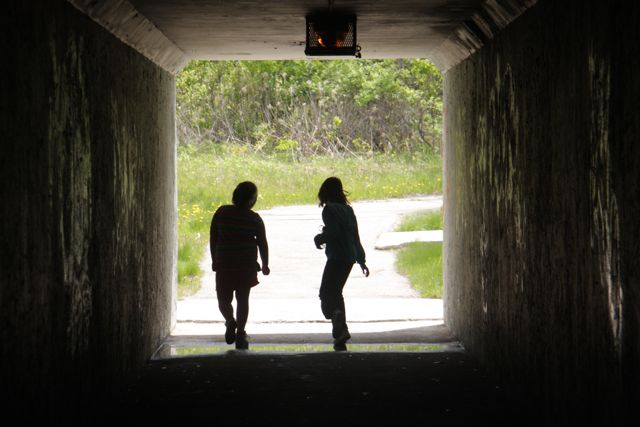 I’m a statistic. I’m one of the women Sheryl Sandburg and others talk about who don’t, in their opinion, help the cause of feminism. I made it all the way to the glass ceiling, peered through the cracks, decided I didn’t like what I saw, and walked out. I’m a “walk out who walked on.”
I’m a statistic. I’m one of the women Sheryl Sandburg and others talk about who don’t, in their opinion, help the cause of feminism. I made it all the way to the glass ceiling, peered through the cracks, decided I didn’t like what I saw, and walked out. I’m a “walk out who walked on.”
There’s a pretty good chance I would have made it through that glass ceiling if I’d “leaned in” long enough. I had all of the credentials and was an ambitious up-and-comer at the time. I took the fast track through the ranks of the public service, had the title “director” added to my name, got the office right next to the corner office, and was making more money than I’d ever dreamed I could.
On top of the career, I had a good feminist husband who carried his share of the household and parenting responsibilities, a couple of beautiful daughters, a house in the suburbs, a minivan, a trailer at the lake, and a boat. You could say I had it all – the feminist’s dream.
And now? I still have the husband and daughters (with an extra one since those days), but I no longer have the trailer at the lake, the boat, the comfortable paycheck or the title of “director” attached to my name. Instead, I have a tiny office in my basement without a window and a fledgling career as a teacher, coach, facilitator and writer.
Some might call me a failed feminist. I let go of the dream that my foremothers fought for. I quit the corporate climb on the wrong side of the glass ceiling. Instead I now spend a good portion of my days creating mandalas with Sharpie markers, hosting story circles, and inviting retreat participants to stitch together quilt squares – not exactly the things a traditional feminist would take pride in.
Why did I walk away from the corporate career and the frequent flyer points in favour of Sharpie markers, quilt squares, and women’s retreats?
There are a few reasons.
- At the height of my career, I had a stillborn son whose presence in my life reminded me that my priorities are not wealth, work, or prestige but rather family, community, and space for spirituality.
- I wanted to find happiness. I knew that the corner office wasn’t my path to happiness.
- I became convinced that it’s time for feminism to grow into something new, and I was pretty sure that I could serve a greater role in helping to birth the new wave of feminism from outside a corporate structure.
It’s that last point that I want to talk about in this article. Instead of a “failed feminist”, I like to think of myself as an “emergent feminist”.
It’s time, I believe, for women to change the world. That won’t happen simply by getting into CEO positions and taking more seats at the boardroom tables. Women will change the world only if we CHANGE LEADERSHIP.
When I was in formal leadership, on my way to the top, I thrived because I learned to think like a man. I listened to the voices of mentors who told me that “feelings have nothing to do with leadership and you should leave them out of the boardroom”, I shut down my intuition in favour of logic, I left my spirituality and much of my creativity at home, I was careful not to be too wild or passionate, and I even started to believe what I was told once that “relationships get in the way of good programming.”
By the time I broke away from formal leadership to start my own business, ten years after being named a director, I was almost completely burnt out from living in a way that was not authentic to me. I returned to the things that made me feel alive – spiritual practices, art-making, wandering in the woods, and relationships – and when I did I realized that THESE THINGS were exactly what had been missing in my leadership practice. More importantly, they weren’t just absent from my own journey, they were missing from leadership in general.
Instead of leaving them at home, I should have clung to them and brought them into my work. Instead of shutting down my feelings and encouraging my staff to do the same, I should have invited them to bring their vulnerability into conversation circles. Instead of creating strategic plans that rarely evoke any imagination, I should have drawn mandalas that wake up the right brain and invite it to the table. Instead of sitting around energy-killing boardroom tables, I should have held staff retreats in the middle of the woods.
For far too long, we’ve accepted a masculine-dominated leadership paradigm in our government offices, our businesses and even our non-profits that is no longer serving us. As Margaret Wheatley and Deborah Frieze say in Walk Out Walk On, we’ve been relying on the leader-as-hero model, when what we really need now is the leader-as-host. In the words of Tina Turner, “we don’t need another hero”. We need people who can lead from a place in the circle, people who can help heal the brokenness in the world, people who help us feel connected again, and people who can remind us of the importance of our relationship with the earth.
“Leadership is about rearranging the chairs, getting the questions right, putting citizens in front of each other and then knowing what’s worth focusing on. The leadership I’m longing for is the leadership that says my number one job is to bring people together, out of exile, out of isolation, and into connection.” – Peter Block
All around us, we see signs of how disconnected we have become – over-consumption of our resources, terrorist attacks, climate change, extreme poverty, etc. These are the stories of a disconnected human race and this disconnection has been fueled by competitive, hierarchical, power-driven leadership that has been allowed to run un-checked.
If the new wave of feminism has a role to play in the world it is not about pushing harder for the corner office, but about bringing us back to a place of connection. Instead of fighting for the top jobs, the power and the prestige, we should be urging our leaders to bring us out of exile and back to community, back to spirituality, back to earth stewardship, and back to ourselves.
Instead of simply fighting to gain entry into the halls of power, we should be working to change the furniture in those halls. It’s time to move the chairs into a circle and open the windows to the world. It’s time to air out the corner office and replace it with conversation spaces. It’s time to replace competitiveness with collaboration, and hierarchy with community.
This is why I decided to walk out and walk on… my role in the world is no longer to fight for power, it’s to help us figure out how to balance power with love. Instead of standing in front of people, I’m sitting beside them and creating space for conversations. Instead of thinking like a man, I’m inviting men to think more like women.
I don’t want the corner office, but that doesn’t mean I don’t want to see a woman there. I will always fight for her right to be there, and when she gets there, I’ll be standing beside her, helping her to take down the walls of her corner office and invite people in. I will urge her to see the world through balanced eyes, honouring both the feminine and the masculine in the world, and creating space for us all to have meaningful conversations that lead the world into the transformation it needs.
I’m now leading from a place in the circle so that I can help other women (and men) learn to do the same. When we’ve gathered into that circle, we can all lean in and listen to each other.
If you’re looking for a new way of defining leadership, join me on a free call on Re-imagining Leadership for our Time on May 1 at 2 pm. Central.
by Heather Plett | Apr 23, 2013 | Leadership, Uncategorized
“I’m finally beginning to realize that I’m a leader.”
Those are the words I heard not long ago from a woman who’d just finished the four month leadership program I was co-facilitating. She was an incredible woman doing great things in her community, including lobbying to save a local nature trail, but she’d never thought of herself as a leader.
I hear those words all the time, especially from women. I’ve been hearing them recently in relation to my online course Lead with Your Wild Heart. “I love your program… but… I’m not sure I’m a leader.” Almost without fail, these women are gifted in art, teaching, community transformation, homemaking, earth stewardship, etc., and yet they don’t see leadership in what they do.
Part of the purpose of Lead with Your Wild Heart is to re-imagine leadership for our time. I believe that the need in the world has changed and that we now need to see leadership through a new lens.
I believe that the leaders the world needs now are those who know how to host conversations, imagine change, paint, dance, sing, write poetry, love generously, live in right relationship with the earth, build community, imagine new ways of using and honouring our limited resources, teach, and play.
As Margaret Wheatley says, a leader is “anyone who is willing to help.” The world needs us to show up and help right now, with whatever gifts we have to offer.
I’ll be hosting a free call on Wednesday, May 1st, at 2 p.m. Central on Re-Imagining Leadership for Our Time.
The call will be an exploration into a new way of defining leadership that fits the paradigm we are now living in. Your questions and ideas on the subject will be more than welcome. One of my deepest beliefs about effective leadership is that it involves hosting meaningful conversations that help surface the wisdom in the circle. Your wisdom is welcome in this circle, and so are your doubts, questions, and curiosity.
I’m happy to be joined in the call by some of the members of my Wise Heart Wisdom Circle. Those who’ve confirmed so far are Desiree Adaway, Julie Daley, and Lisa Wilson.
Sign up below and you’ll receive the call information in your inbox. I look forward to our conversation!
ALSO… over on Facebook, I’m collecting “what if” questions about leadership to inspire us for the conversation. Scroll down below the sign-up form to see the ones already gathered, and add your own to the comments of this post.
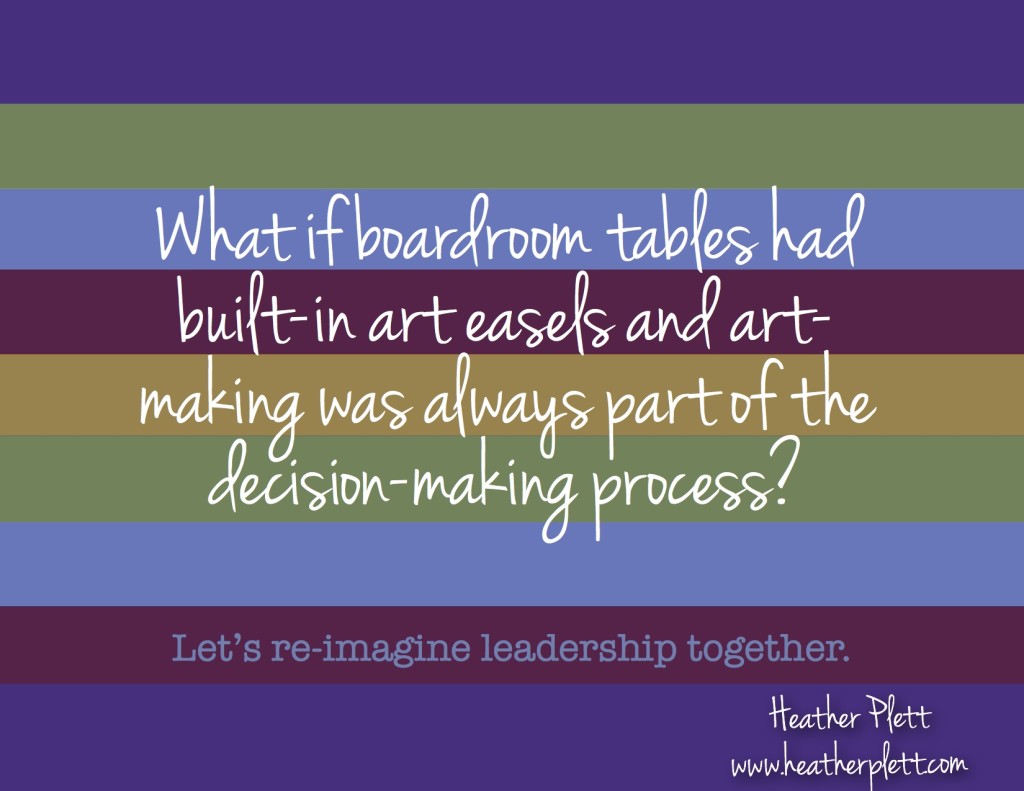
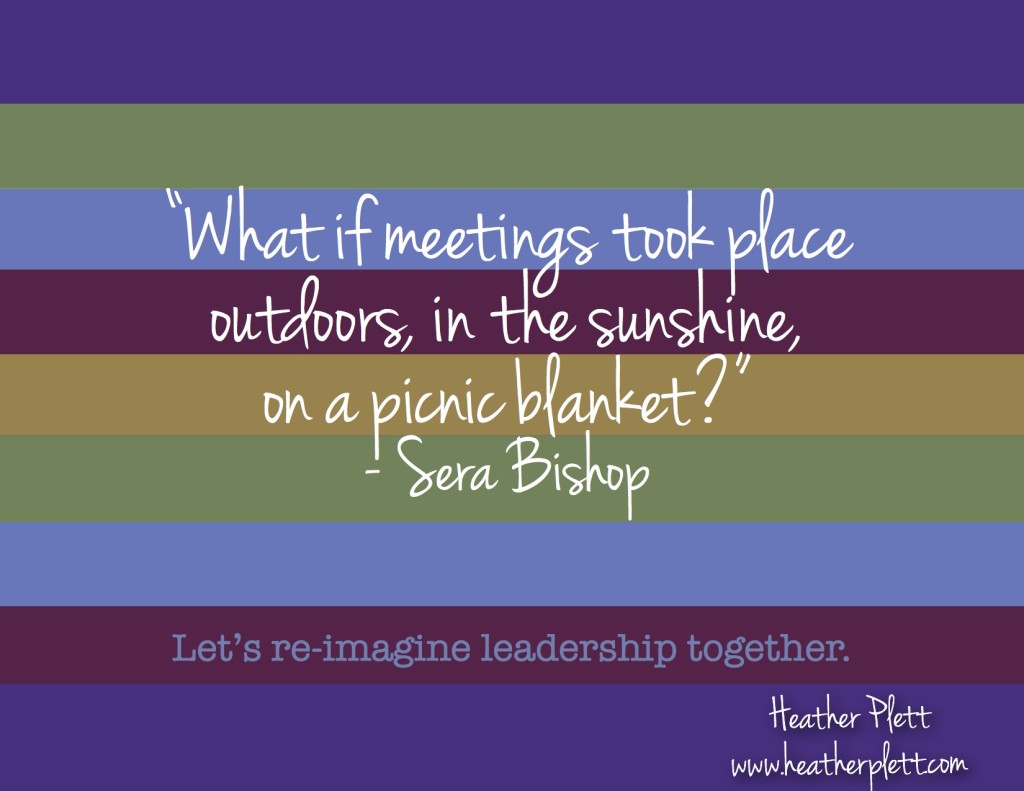
by Heather Plett | Apr 5, 2013 | Creativity, growth, journey, Leadership
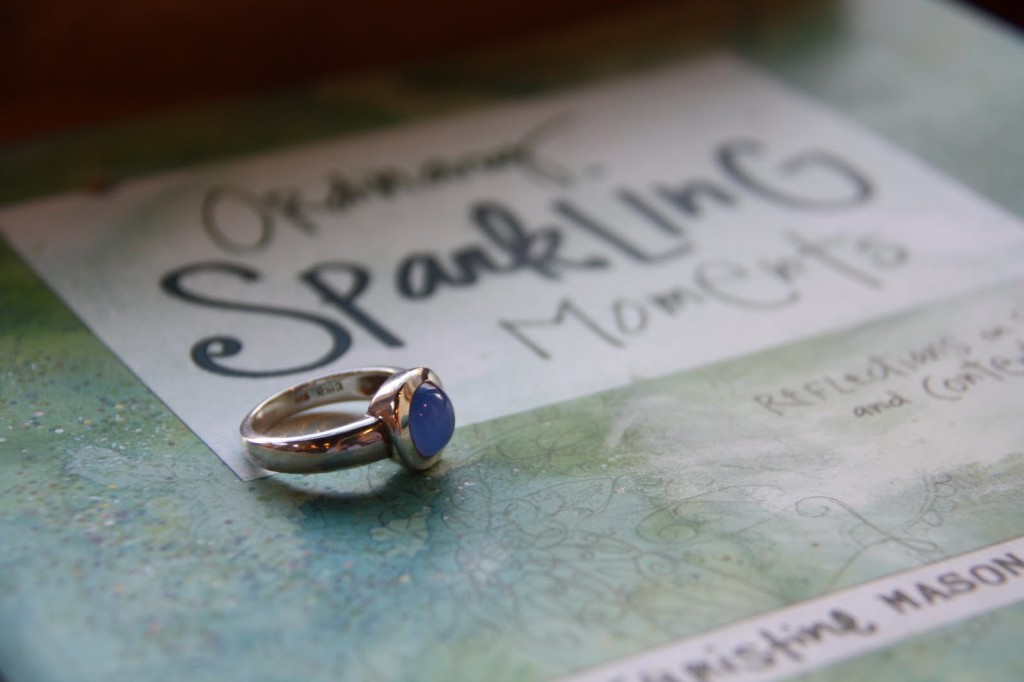
Three and a half years ago, I brought myself a promise ring.
I was visiting Banff at the time, after a business-related road trip through Western Canada. Visiting Banff always brings up mixed emotions for me. I love the beauty of the place, in the middle of the Rocky Mountains, but it holds a sad story from my past. I lived there the summer I turned 19, and it wasn’t a particularly happy summer. I was in that “trying to decide whether to stay safe in life or to take more chances and risk getting hurt” phase of early adulthood. Sadly, I let the things that happened to me that summer convince me that safe was a better option. I gave up the plans I’d had to change schools and move to another province and I went back home to nurse my wounds and play it safe.
One of the places that always brings up deep longing for me is the Banff Centre. When I lived there, my roommates and I sometimes went to watch visiting performers, and each time I went, I’d think “oh, if only I were talented enough to spend time at a place like this!”
When I visited three and a half years ago, I drove past the Centre and started to cry. I cried for the young woman I was more than twenty years earlier who believed she wasn’t talented or worthy. I cried for the hurts that young woman had already suffered and had yet to suffer. I cried for the long journey I’ve had since then, learning to trust both my worthiness and my longings, and learning to be both resilient and courageous through the hard times.
When I drove back into town after visiting the Centre and the resort where I spent the summer cleaning other people’s mess out of hotel rooms, I wandered through the downtown and dropped in at a jewellery store. In a flash of inspiration, I bought myself a promise ring with a blue chalcedony stone. (I later learned that the chalcedony speaks of spirit and trust and is known as the Speaker’s Stone, the stone of one who must measure his words. It encourages reflection and meditation, its gentle radiance preparing us for action but helping to hold back words we might regret. The great Roman orator, Cicero, is said to have worn one around his neck.)
Later that day, I sat in a cafe with my journal and wrote the following promise to myself:
I promise:
– I will take more chances.
– I will believe that I am an artist.
– I will trust my ability.
– I will look for opportunities to paint and make art as often as I can.
– I will sign up for another class or workshop that stretches me.
– I will honour the muse.
I couldn’t go back and make those promises for my 19 year old self, but it wasn’t too late to make them for my 40+ self.
Last week, in the last lesson for Lead with Your Wild Heart, I invited participants to make a commitment to themselves and to honour it with some kind of gift, like a ring. That tweaked my memory and I went back to find the original post I wrote about the promise ring I’d bought for myself. I started crying all over again – not because I was sad anymore for my 19 year old self, but because I am delighted for my 46 year old self that I can honestly say that I have kept my promise to myself.
I have done just what I said I’d do. I took more chances (quit my job and started a business), started making more art and taking art classes, I’ve been honouring the muse, and trusting my own ability.
Nothing to date has felt so much like an honouring of that promise as the creation of Lead with Your Wild Heart. Nothing has felt so much like it is emerging out of my most authentic, most beautiful, most Spirit-guided self.
I’ve just opened registration for the second offering of Lead with Your Wild Heart, and I can say that I am thrilled beyond expectation with how beautifully it has turned out. This has been an exercise in trusting my own wild heart, and I know that it will serve as a gift to all those who take it into their own wild hearts.
And now… can I tell you a little secret? I’m dreaming of taking some version of Lead with Your Wild Heart to the Banff Centre for Leadership Development. I don’t know yet how to make that happen, but I’m sharing the dream in hopes that will help me get closer to it.
I’m trusting my wild heart and seeing where it leads.
by Heather Plett | Mar 1, 2013 | circle, Community, Leadership, Passion
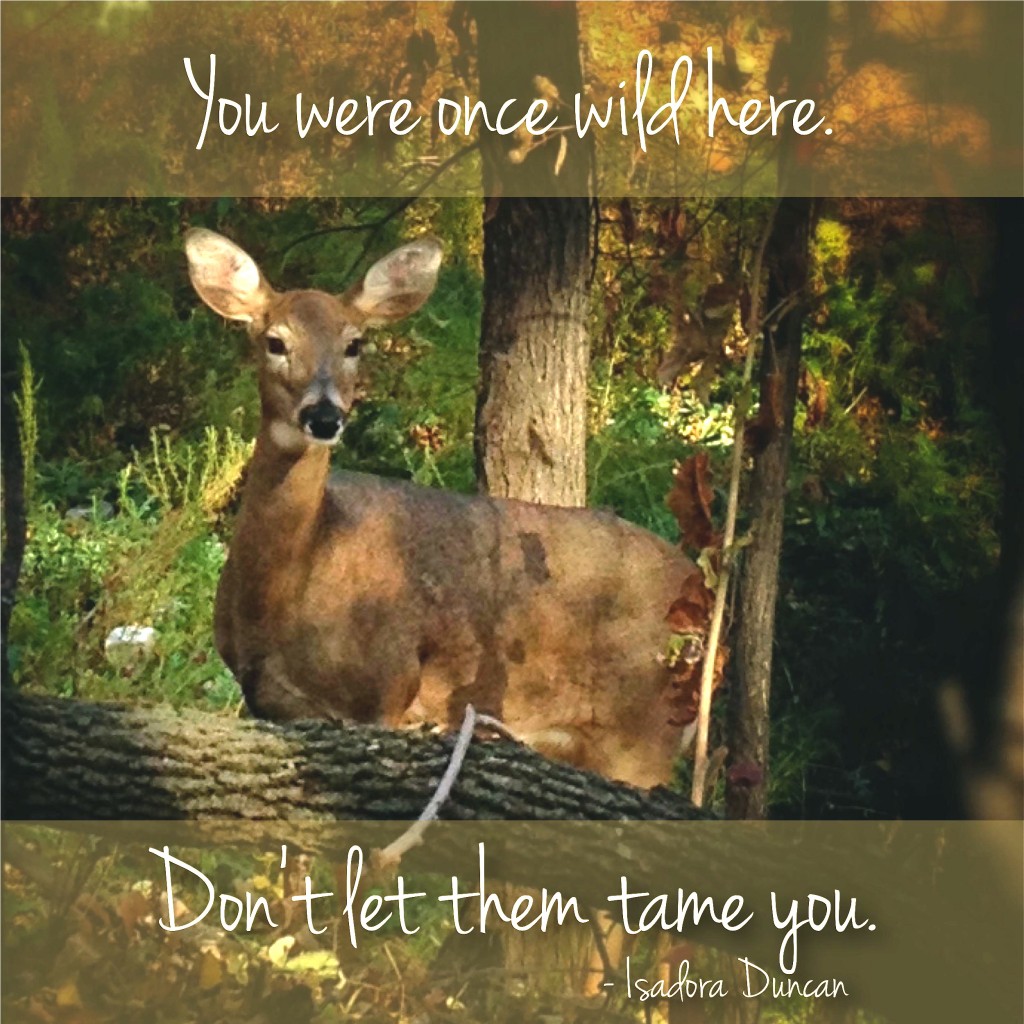
I didn’t know how much launching Lead with your Wild Heart would change my life and my business, but it has, dramatically. Interviewing the incredible members of my wisdom circle, researching, writing, and teaching this program have taught me more than any course I’ve ever taken or ever created.
In shamanic language, this feels like my original medicine – the gift I’m meant to contribute for the healing of the world. In helping women (and, in the future, possibly men) get closer to their wild hearts, I am becoming intimately familiar with my own. (The next offering will begin in May, and I expect there will be in-person offerings to come as well.)
The seeds for this course came to me one day last summer when I was wandering in my favourite woods. There are often deer in those woods, and I have such great reverence for deer that I always stop to pay attention when I see them there. Often I follow them deeper into the woods.
One particular time, I almost missed the deer that was standing completely motionless about ten feet from the path on which I walked. The deer was watching me, and when I stopped on the path, we stood locked in a visual embrace for what I think was about ten minutes but what felt like an eternity.
I walked away from that encounter with the profound sense that the deer needed me to understand something that I’d been missing before. Further along the path, it came to me. “I need to create a program called Lead with your Wild Heart. I need to teach women how to get reconnected again.”
The deer invited me back into the wild – back to my wild-hearted trust, wild-hearted love, and wild-hearted courage. Those are the things I now share with the incredible circle of women who have gathered for this program.
Sometimes my coaching clients lament that they are not very good at planning or goal-setting, and I tell them “Maybe you don’t have to be. Maybe you just need to be good at wandering in the woods and listening for the wisdom.” You won’t hear that in business school, but my best ideas have almost always emerged when I’ve found time to be silent in nature.
The deeper I go in this journey, the more I understand what it means to be wild again.
To be wild again means that:
- We are connected with the earth, the wind, the deer, and the trees.
- We are connected with each other in a deeper way than our culture encourages.
- We trust that which is primal and wild in ourselves and we offer our most natural gifts to each other.
- We trust that which is primal and wild around us and we honour the wisdom of creation.
- We remember that we are stewards and citizens rather than consumers and conquerors of this earth.
- We dare to weep when we are wounded, laugh when we are joyous, and touch when we are in need of each together.
- We reclaim the circle and gather around the fire, sharing our most vulnerable, wild stories.
- We dare to plunge the depths of our wild hearts and honour what we find there.
- We sing and dance, trusting both our voices and our bodies to be expressions of the sacred.
- We are courageous warriors, serving the cause of all that is good in the world.
- We dare to believe that the world is a good place to call home.
 Nobody told me about the loneliness.
Nobody told me about the loneliness.





